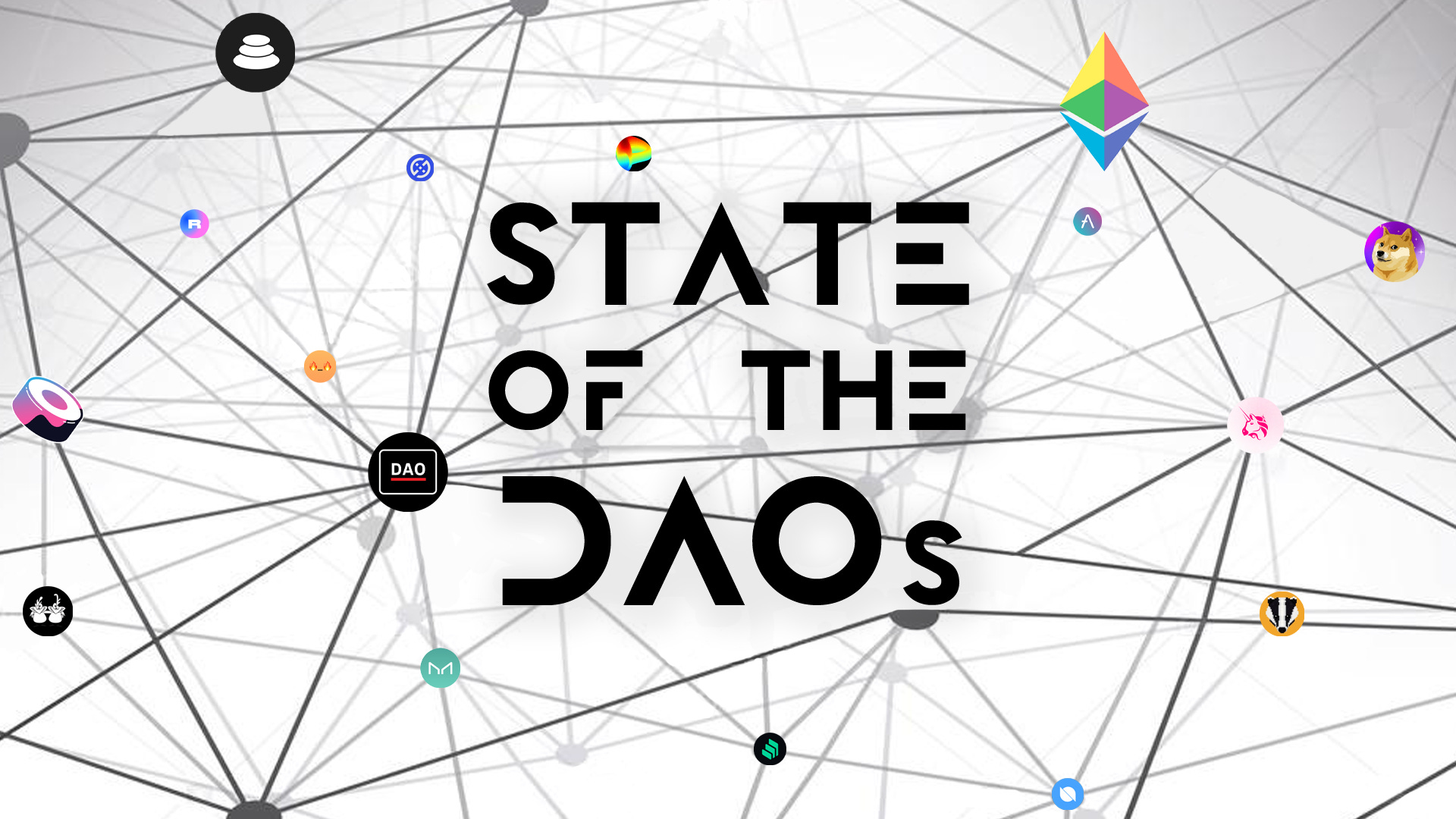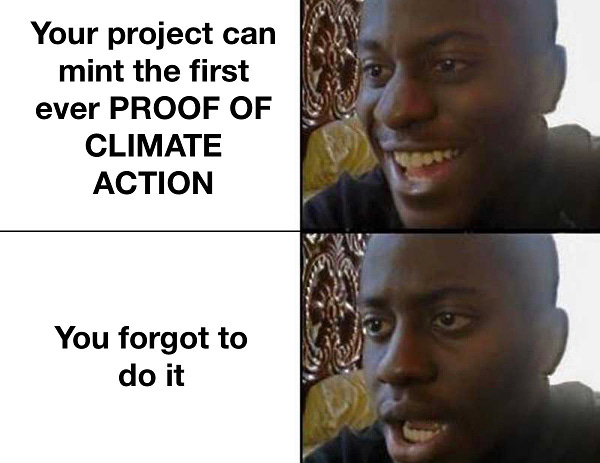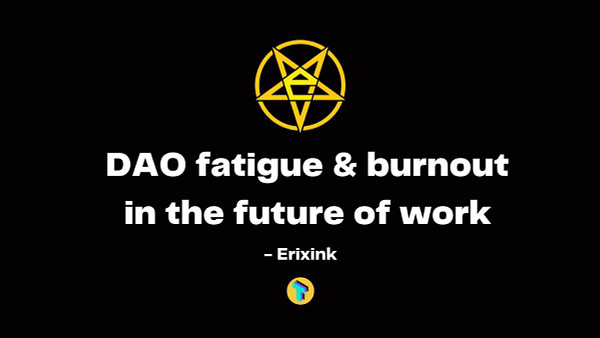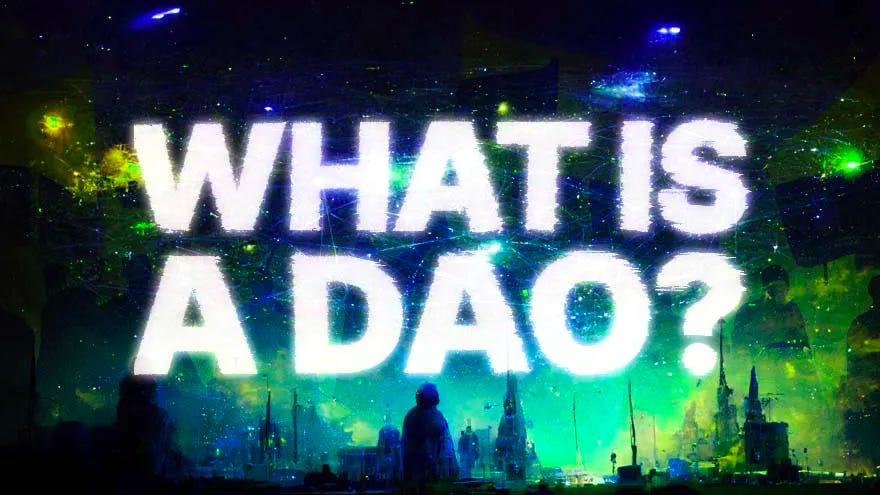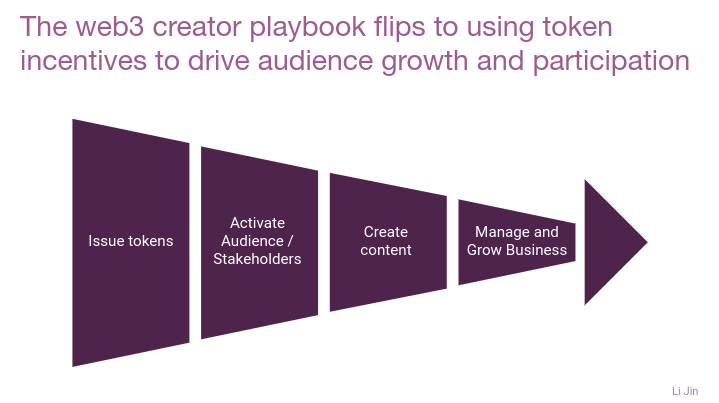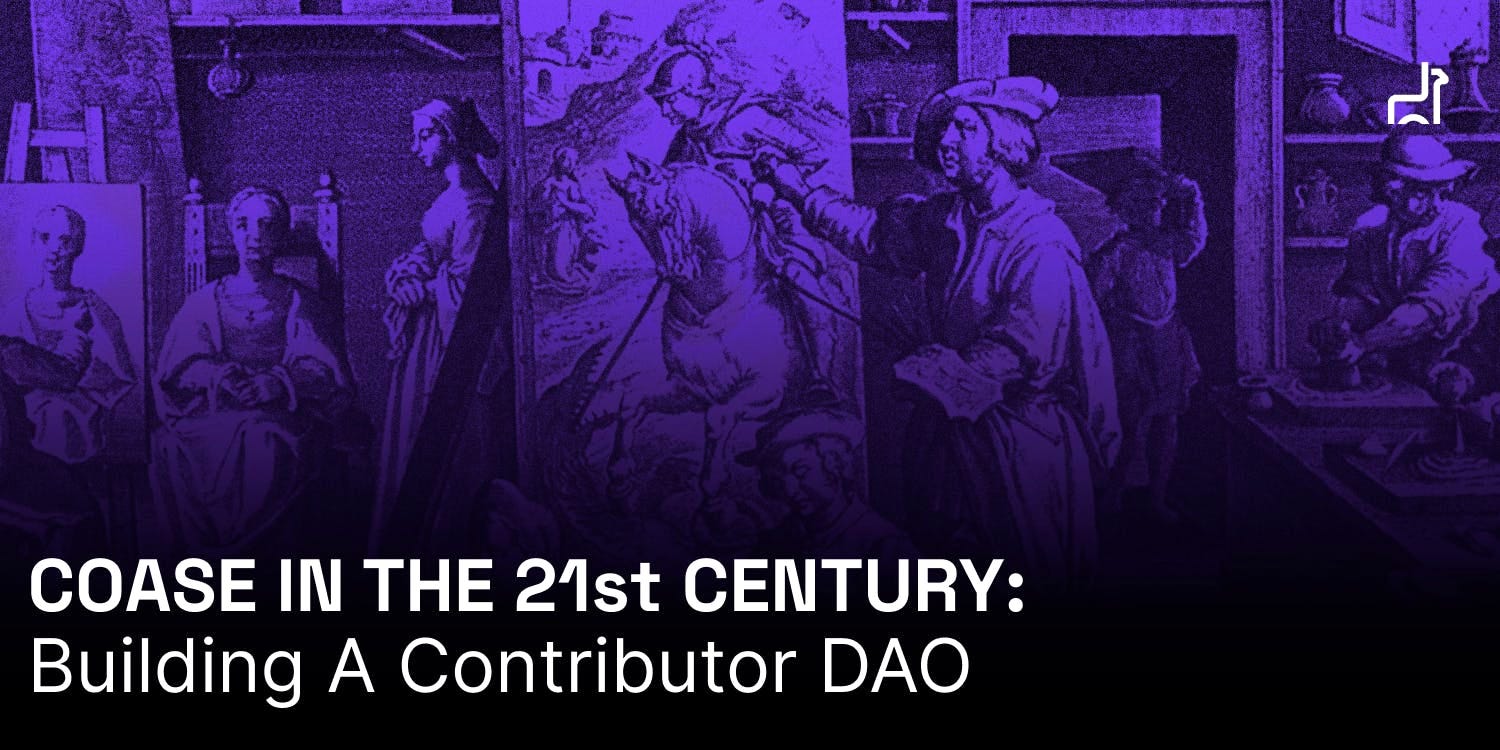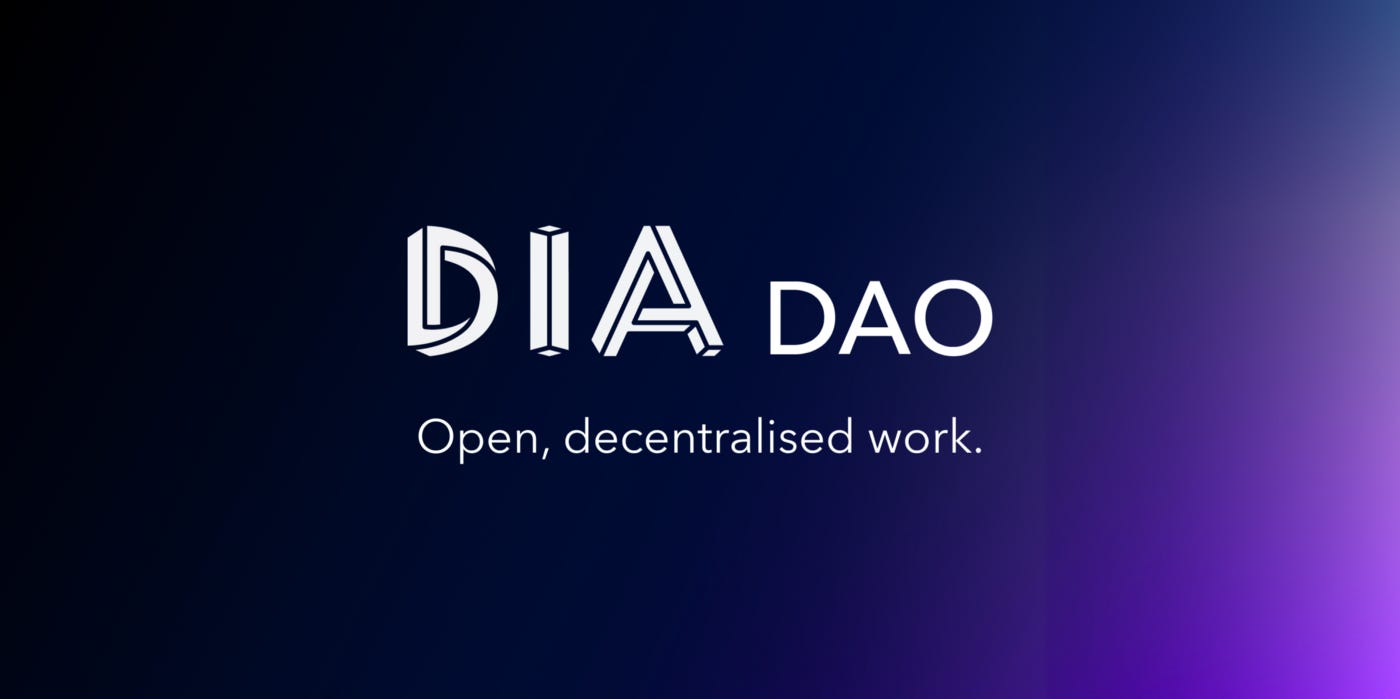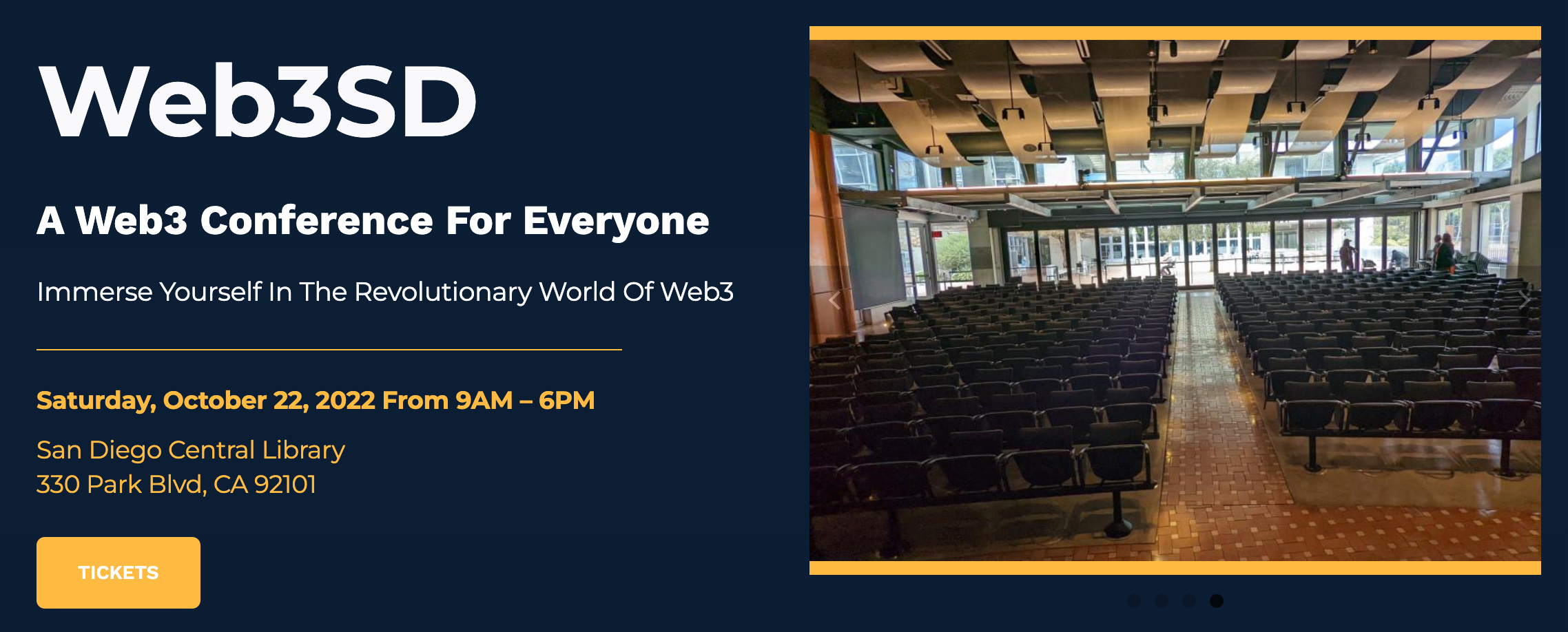7 Tips to Avoid DAO Burnout | State of the DAOs
7 Tips to Avoid DAO Burnout | State of the DAOsYou're reading State of the DAOs, the high-signal low-noise newsletter for understanding DAOs.gm and welcome to State of the DAOs! Our mental health is our greatest asset. We have all experienced DAO fatigue from the endless notifications, weekly meetings, voter fatigue, and chasing opportunities. We are often trying to do too much at one time. DAO fatigue and burnout are real, and it can take months or even years to recover from the impact it has on our physical and mental health. This week, Frank America gives us 7 tips for building a healthy working relationship, where we are able to show up fully, while being adequately recognized and compensated for the work we are doing. By learning to invest time and attention towards taking care of ourselves, we can notice when we are feeling overwhelmed and overextended, set appropriate boundaries, and take the time necessary to rest to prevent burnout. Next, we feature an interview of All for Climate DAO (A4C) co-founders Xavier and Leen. A4C is a web of decentralized, self-determining collectives focused on climate activism and social justice. They offer grassroots teams an alternative to the overhead of operating as a traditional nonprofit by providing a launchpad that turns dynamic movements into sustainable collectives. Hear the story behind how they built a web of projects working on climate and social justice initiatives around the globe. Finally, we share the TL;DR on some of the best DAO ecosystem takes and thought pieces, making it easy for you to cut through the noise and learn everything you need to know the current state of the DAOs. Contributors: BanklessDAO Writers Guild (Frank America, Seneca52, angelspeaks, Alvo von A, Quilia, Teafeh, Leah_par, Jake and Stake, hirokennelly, siddhearta) This is the official newsletter of BanklessDAO. To unsubscribe, edit your settings. 7 Tips to Avoid DAO BurnoutAuthor: Frank America
Many people in the web3 space are in more Discord servers than they can count. In these communities, they may have obligations ranging from administrative tasks, to major writing or audio/video assignments, or even nebulous directives like governance coordination. In light of all this, one thing is certain: DAO fatigue is real. So how do we avoid getting burnt out on DAOs? Here are seven suggestions:
Mute Push NotificationsThis may seem like a small thing to do, but how many of you have been in some level of sleep only to hear your Discord notifications going gang-busters because someone posted a funny meme from Australia? Choosing to engage with your DAO 24 hours a day is a serious psychological factor to consider. The first step to combating DAO fatigue is to engage your DAO on your own terms. This doesn’t mean you have to turn off notifications, but that you turn off push notifications (the ones that show up on your phone no matter what) and limit regular notifications to the isolated zones of a Discord server that are relevant to you. If you, like me, are in it for the long haul, then consider that notifications don’t have to appear on your mobile phone the instant they happen. You know you’re going to engage your DAO, so just pick the times that work for you. This is a lot less overwhelming than seeing them in your palm every time you check your phone. Think of it like DAO housekeeping. Side note: there is a subliminal tax that is paid every time we check a notification. Whether it is for a like on Twitter or Facebook, an updated post on a forum we follow, or a simple ‘sup’ from a long time friend. Control your phone, your computer, and manage your notifications. Engaging your DAOs on your terms is a huge leap forward in combating DAO fatigue.  This @hubermanlab Q&A raises an important point about screens that's not discussed much: the effect of literally focusing in on such a small space & what that does to our eyes & attention. It's all worth a listen, but the screen stuff begins @ 21.00 Stop Attending Non-Critical Weekly MeetingsBefore you go to a weekly meeting ask yourself, “Is this weekly meeting critical to how I can help this project, team, or group of people?” Chances are there is work you could do that would further the cause more than draining another hour on the old Discord audio. DAOs are non-local, asynchronous groups that collaborate and coordinate across time zones toward mutually shared goals. While granted, voice-syncs are inherently valuable for social morale building and getting things done “in real time”, the fact of the matter is, we’re in UTC mode. DAOs follow the sun with their efforts, and are not optimized for worldwide synchronous sessions. Finding ways to enhance efforts being equally valuable any time they are contributed is a key value-set for successful projects. Another idea might be to swap out one meeting every week to five separate micro-sessions across as many time-zones, twice a month, where small pods of people voice-sync on what they’re all working on, or want to work on. Make deliverables required to attend the meeting. Create skin in the game. If we make non-critical meetings non-mandatory and create a culture where attendance doesn’t equal performance then people will get used to creating and completing bounties or assignments non-synchronously. Once-a-week doesn’t seem like a lot for the first few months when we’re on our DAO honeymoon, but 52 times a year (times the number of teams you’re on that meet weekly), times a multiple year commitment may becomes too much. Often what takes place in a meeting may be supplanted by a few targeted DMs, and a couple of shared gDocs. This maximizes a DAO’s strength: people do the work and engage when they want to. Your time is valuable and if you want to avoid DAO burnout, keep your focus on the producers, engage the newbies a-synchronously, and put your attention into meetings where things get done, while also encouraging more asynchronous work. Choose Your Favorite DAO and Stick With ItOkay, this is a hard one but think about it. There are too many DAOs to choose from and you can’t be in all of them. Pick a like-minded group or niche that furthers your goals in web3, and dig in. Let go of the superficial involvement in a myriad of DAOs, and drop the big-game POAP hunting. If you want to avoid burnout, then pick it, and stick it. Everybody has seen that one DAO member who is gonzo for two to five weeks then crickets. If after a substantial amount of involvement in a single DAO things aren’t working out, then offload your obligations and start dating again. Don’t Work for Governance TokensIf you really wanna go the distance in web3, stop working for governance tokens. This isn’t exactly what it sounds like, and is a controversial take, but many DAOs reward efforts with what many affectionately call worthless governance tokens, which enable holders to vote in Snapshot or other web3 governance protocols. Often, governance is merely a synonym for token-weighted voting, and since these tokens often have no other utility (other than perhaps representing equity in the DAO or providing access to gated systems), and since most Snapshot votes are overwhelmingly in favor of a proposal, then one could argue that people are simply working for something that doesn’t have a ton of value. To go the distance in web3 you need to find a way to pay or earn in hard currency; that’s BTC, ETH, or a stablecoin. The optimistic side to consider here is that if you’re doing work to learn a new skill, or become better at something that makes you more marketable in web3, or to build your social network and influence in the space, and governance tokens are a by-product of those efforts, then self-improvement is the value set you are working for, and that is very healthy as self-development is crucial. Just think, a year ago I didn’t know how to use MetaMask, Coordinape, Snapshot, DeWork, Mirror, Uniswap, OpenSea, Optimism, Polygon, Guild.xyz, Collab.Land, Poap.xyz, and a myriad of other tools in my web3 kit. My take is that I wasn’t working for governance tokens. I was working to learn these new skills, and if a multi-sig sent me a bunch of governance tokens on the tail end of that, well that’s fine too, but it’s not why I did the work. So figure out what you’re working for, and adjust accordingly. To the degree DAOs can, they would do well to pay, operate, and calculate in BTC, ETH, and DAI only. Specialize Your Method of ContributionAnother method to combat DAO fatigue is to think about how you apply yourself. Marshal your skills and select your tools carefully. You gotta build a niche. Aim to be the, “Oh, you need to talk to that person” person...” You don’t want to be the “Anybody can do this job, but I’m doing it because I said I would” person. Specialize how you contribute to DAOs. If you have a particular speciality, let that be known, and deliver on that, and only that. Don’t just raise your hand for tasks because “it takes a village”. Let people that don’t have specialties or don’t want to cultivate them take on those jobs. In fact, if you have a speciality and are doing anything that doesn’t tailor to that skillset you are doing your DAO a huge disservice. With that said, everyone needs to “earn their stripes”, so to speak, so some amount of, “hey, I’m just here to help” may be in order for a while. But once you find your groove, stick with it. Applying your expertise, effectively, will greatly reduce any chances of you encountering DAO burnout. Mitigate Decision Paralysis and “Death by Democracy”Here’s another controversial take. What the majority of people want to happen is rarely the best thing for a DAO. Typically what happens is that someone comes up with an idea, and people are excited, so they vote for it. But not all of these ideas are winners and a DAO can hurt itself by trying to do too many things at once. This is what I call “death by democracy”. Instead, DAO’s could trust individuals who have already built trust via results, more and more over time. To accommodate this accreditation theory, voting could be weighted against demonstrated efficacy, that is by reputation, and results. Voting should not be weighted not by the number of tokens held, but by the clout built up by delivering results that benefit the DAO. Without some centralized nodes of authority that these trusted contributors represent, DAOs can end up treading water. Just think of all the multi-sigs that have funds sitting there since the last bull cycle simply because 4 out of 7 people can’t figure out what to do with them? That “slack energy” isn’t just represented financially, it occurs in DAOs politically and socially too. Garnering a small amount of consensus amidst trusted DAO members can alleviate that slack, which brings up the last tip. Voter Fatigue Is Real So Let’s Just Delegate InsteadVoter fatigue is real. If every decision needs to be put to a vote, and every forum post needs X amount of “Yes” and every Snapshot needs Y amount of signatures, then things just can’t get done in an expedient manner. If you don’t think voter fatigue is real just look at Snapshot participation rates during the bear market. A possible remedy to this is that DAO members could appoint a small batch of their team to make decisions for the whole guild, project, or DAO, within an agreed range of influence, at the onset of some fixed interval of time (quarter, season, year, etc). That’s it. Take time to delegate voting at the beginning of a season, and then the delegates take it from there. DAO members could withdraw their delegations and re-delegate after fixed periods if performance was lacking. Otherwise, they could roll forward. If it ain’t broke don’t fix it. Sometimes too much rotation in DAO leadership can cause a lack of progress. Other times no rotation can halt growth. Either way, this delegated authority would enable DAOs to move faster, and grow more quickly, as well as reduce contributor burnout across the board. DAO Burnout Closing ThoughtsThese seven tips to avoid DAO burnout are just that, suggestions. This may not be right in every case or for every DAO, but hopefully some of these tips help you manage your efforts in the web3 space to build towards sustainable, repeatable efforts and contribution, such that we can all grow faster and stronger, together. Actions steps📖 Read 7 Mental Health Tips for This Bear Market | Jem Khawaja ⛏️ Dig into How to Survive a Crypto Bear Market | frogmonkee Impact DAO StudyImpact DAOs Research + Book project is a decentralized, collaborative and open source project. The goal of the project is to publish a book on Impact DAOs that provides information, wisdom, and insights for new web3 entrants. The project covered ten DAOs in total, conducting three in-depth conversations per DAO. To learn more about the project visit the Gitcoin grant page. If you’d like to follow their work they’ll be regularly sharing their learnings and DAO builder interviews on ImpactDAO Media. You can also follow the hashtag @ImpactDAOMedia on Twitter. Making Activism SustainableAuthor: Seneca52 All for Climate DAO (A4C) is a project of projects, intended to be a home for anyone working on climate and social justice initiatives. It is currently fulfilling this role for over 160 such projects or ‘collectives’. The conceptual foundation is that organizations and activists focused on sustainability should be sustainable themselves. In this chat with co-founders Xavier and Leen, our ImpactDAO Media’s own Crystal touched on all the most important aspects of the motivation, methods, and mayhem behind the Zen-like simplicity of the project website (like an eye bath for the age of content overload - check it out). As usual, if you are looking for deep insights, you will want to check out the full interview.  📣interview of founders @leen_schelfhout & @xdamman of @all4climatedao is out 🎉 they are the best on all things dao. real talk👇
🌅 @all4climatedao origin
💚 web3 + climate
🗳 deep democracy
🌐 real decentralization
🛠 tooling
➕ lots of dao goodness
cryptogood.substack.com/p/all-for-clim… Why A(nother) DAO?Engaging in grass-roots climate activism is the alternative to waiting for an existing NGO or agency to fix the world’s problems. However, doing this by the book brings with it many bureaucratic tasks that are enough to sap the resolve of the most motivated team before any impact has been made. Furthermore, formal structures presuppose a stable, slow-moving organization with a clear hierarchy. Whereas grass-roots organizations are typically more fluid in their activities, headcount, and leadership. All for Climate DAO offers such grassroots teams a launchpad and a means of keeping going, without having to worry about the overheads that can turn a dynamic movement into an insipid bureaucracy. “We have all the legal statutes needed, can receive donations, and a bank account”, says Leen. This is also important for applying for grants from traditional organizations, such as the European Climate Foundation, which are only allowed to deal with nonprofit legal structures.  Remember!☝️✨
The first ever Proof of Climate Action of your @gitcoin #climate project is still mintable until October 22th! 😉
Don’t let your @Poca run away! 🌎
poap.delivery/poca-gitcoin-g… Two Worlds IntersectLeen sees a significant philosophical overlap between the climate movement and the web3 world, albeit they are approaching the same solution from different angles. The concept of a flat, organic, and permissionless DAO is easily understandable to activists who are familiar with organizational structures found in Reinventing Organizations, such as Sociocracy 3.0, and Holocracy. Of course, the term ‘flat’ does not mean that no one is driving things forward. Such individuals are known as ‘locomotives’ in A4C dialect. That said, decision-making is purposely informal. “If it is truly a common issue,” says Xavier, “then a lot of people will vote for a proposed solution, and then once there is kind of an agreement, a new working group emerges.” Given the preference for organic rather than highly structured processes, it is difficult to describe in detail how things work, except through intuitive phrases such as ‘navigating by tension’ (i.e. where concern over a specific pain point becomes apparent, a conversation and decision will naturally form and follow). Tokenomics & ToolsTasks that are discrete and well-defined can have bounties attached to them (e.g. 100 DAI for running a Twitter space). However, the main reward is the native token or community currency. While the token can be bought, the pricing mechanism discourages buyers from accumulating large amounts, as it is not primarily intended as a funding mechanism. “The first utility of the token,” according to Xavier, “is to really have a map of all the people that contributed to the network.” In other words, the token holdings of the community should reveal who is contributing and at what level of intensity. The DAO uses a familiar range of tools (DeWork, Circles, Open Collective) to help oil the machinery and keep costs down. But like most of the best-in-class DAOs we’ve spoken to, tools are seen as ancillary rather than core. “That's where all of those scams basically happen,” says Xavier, “when people think that those tools could actually replace that human connection - but they can't.” The Key FactorContinuing the human connection theme, an unusual facet of A4C is the emphasis placed on onboarding. Leen personally holds a live 30-minute interview with every new collective that joins. This not only has a practical purpose, but is an important part of the DAO’s core essence. “All for Climate really is about human conversations and human connections,” Leen explains. “Community building is definitely a value we want to see.” Xavier echoes this idea: “At the end of the day, money, tokens, it's just numbers. What we are craving is meaningful relationships and opportunities to grow, and to learn through those relationships.” For many years, the environmental movement has pioneered the proactive mentality of “Think Global, Act Local”. A4C’s web of decentralized, self-determining collectives already spans the globe, and yet remains connected to the founders and their founding values. Those lamenting the ongoing ‘crypto winter’ should take heart from the fact that intrinsic motivation is hard to extinguish, and may be the ultimate technology that powers web3 into the future. DAOs at a Glance
 DAO contributor burnout is a very real thing.
DAOs are addicting, challenging, and often overwhelming.
Today on the Tally blog, @erixink_ helps us identify DAO Fatigue and tells us what we can do to prevent burnout in the future of work.
Read here: bit.ly/3pEU1TA What Is a DAO?Author: Rahul Nambiapurath DAOs are flexible, trustless, and transparent organizations, and they are likely to be adopted by all spheres of society. Governance has always been a problem at the heart of organizations, but the introduction of DAOs and smart contracts has made decision-making easier. DAOs set down rules based on smart contracts, which members are bound to follow. All DAOs share digital assets in treasuries, giving token holders voting power to make decisions about how the DAO operates. With no restrictions to how DAOs can be formed or what rules can be encoded in their smart contracts, any online community can decide to spin up a DAO to leverage the power of a community aligned behind a shared purpose. Leadership is a Constant StruggleAuthor: Steph In DAOs we often hear the phrase, “the leader is the person who knows what to do next.” And yet, as Steph points out in this article, in DAOs leadership is a constant struggle. Leaders need to hold the vision of the organization clearly in their mind, while recognizing that the perspectives and orientation are constantly changing. They need to be effective storytellers, to contextualize the day-to-day of what we are working on with the long term vision. And at the end of the day, it all comes down to collaboration and operations. Leaders are constantly navigating the tension between these three in order to drive the organization forward. The New Creator Playbook: Jumpstarting Communities Through TokensAuthor: Li Jin Web3 has inverted the traditional online content creation model. Pre-internet, creators imagined their content, then pitched it to publishing institutions. This meant giving up significant control over their process and a considerable stream of future earnings in exchange for upfront funding and distribution of their work. In web2, creators generated free content to build a large fanbase that could later be monetized through advertising, subscriptions, and merchandise. Now, in web3, creators start by monetizing through the creation of a token (fungible or otherwise). This attracts an initial audience of fan-owners who want to support the artist and enjoy the potential upside from owning the asset. Digital scarcity underpins this model. As the creator becomes more successful, demand for the token increases and so does its price. The creator uses the capital to launch their work and stakeholders form the base of a community. In the web3 creator playbook, artists not only great great content but also become community builders. Coase in the 21st Century: Building A Contributor DAOIn this article, Shreyas explores a question by the economist Ronald Coase: why does the firm exist? Corporations exist to drive down transaction costs. The major reason why employees of an organization pool their efforts together(as against individual marketing) to sell their services is to reduce the costs of doing business. In recent times, the internet has been a means for effectively reducing communication costs between individuals by eliminating the need for intermediaries. People can now provide goods and services to companies and individuals who need them. But this is not a permanent salve because transaction and communication costs are still on the high side for certain services like complex coordination. The introduction of DAOs serves as blockchain native organizations with pivotal rules monitored by smart contracts. With permissionless capital formations, contributor DAOs makes it much easier to source out jobs or services without necessarily reporting to a higher authority, while being able to exclusively negotiate on a contract for service rendered. Ecosystem Takes
Student Organizations Pull Their Weight in DeFi Protocol GovernanceAuthor: Sage D. Young 🔑 Insights: As a way to be heard and understand decentralized governance within the Web3 ecosystem, student blockchain clubs are becoming more and more involved in on-chain governance.
The Rise and Fall of Bitcoin CultureAuthor: Paul J. Dylan-Ennis 🔑 Insights: Bitcoin hasn’t always had maximalists. In the early days, interested parties would come together on bitcointalk forums to share ideas about crypto or their other varied interests. The resulting environment wasn’t necessarily kind, but it did provide a platform for discussion and education.
Community ownership is a self-fulfilling prophecyAuthor: Joey DeBruin 🔑 Insights: Community ownership presents advantages for both businesses and society. While it is beneficial to both parties, founders still find it hard to make community ownership work. The writer believes the best way to do this is through trust and transparency.
DAO Spotlight: DIA DAODIA (Decentralized Information Asset) is a multi-chain, open-source platform that provides verified data and oracles to web3 dApps. While there are streams of data being passed around in the blockchain, there is a need to gather the right data and validate it for use. This is what DIA works to accomplish. Since its inception, DIA's mission has been to build a decentralized community that self-organizes around diverse skill sets to drive sustainable value to the project. With the goal of becoming a true DAO, DIA adopted the most suitable legally embedded DAO framework in Switzerland and issued its own governance token. DIA leverages a community of incentivized skills to source decentralized financial data from both on-chain and off-chain sources. This data is then delivered on-chain to developers on all Layer 1 and Layer 2 networks. Any person or organization interested in affordable, transparent financial data can fund a request ticket on Github. This task is then bountied out on the DIA platform. Data providers act on this information and create scrapers that sift through on-chain or APIs databases to provide the requested data. Once the code is submitted, the data is validated through a stake voting process. The valid data is then stored in a permanent, open-source database and published on the DIA platform, to be accessed freely by anyone. The DIA token allows its holders to make meaningful contributions to its product, reward contributors for their work, participate in governance, and vote on initiatives and opinions. You can become a holder by contributing to the project or buying them on all major DEX and CEX. Since its launch in 2018, the DAO has engaged in a number of relevant proposals and votes. This includes implementing an airdrop for DIA token holders who were affected by the 2020 KuCoin hack and how treasury funds should be utilized for value across the DAO. The DIA DAO forum was also launched in the effort to increase community involvement in its product, while cultivating new relevant discussions. Join The Community! Want to contribute open-source, decentralized financial data? Then sign up in DIA DAO Discord and complete the initial onboarding task via Dework. DIA is able to organize and scale operations by utilizing Dework, so you can start working on a real task as soon as your onboarding task is approved. Get Plugged InEvent Highlights Are you truly passionate about 🛠️👨💻 #building?
We are heading to @ETHLisbon & here’s why you should too:
🔧The best builders in the world
🎓Workshops from the best protocols
🏆Multiple prizes + bounties up for grabs
Secure your spot 🔒👇
ethlisbon.org If you liked this post from BanklessDAO, why not share it? |
Older messages
Dolce&Gabbana, Sorare, and the Value of Art on Unreliable Blockchains | Decentralized Arts
Tuesday, October 18, 2022
Dear Bankless Fam, “How do you think I'm going to get along Without you when you're gone You took me for everything that I had And kicked me out on my own” So begins the second verse to one of
Pillars and Polkadot | Bankless Publishing Recap
Monday, October 17, 2022
Top-shelf Educational Web3 Content Shipped Directly to Your Inbox
SAFE Encounters of the Governance Kind | BanklessDAO Weekly Rollup
Saturday, October 15, 2022
Catch Up With What Happened This Week in BanklessDAO
Blockchain Gaming Goes Mainstream with Epic and Azra Games | Decentralized Arts
Tuesday, October 11, 2022
Dear Bankless Fam, If DustyEye were a Chippi, how would it be represented? Perhaps his appearance would be marked by chronotemporal leaps and he would bring with him some of the objects presented in
Bubbling Up Better Proposals | BanklessDAO Weekly Rollup
Saturday, October 8, 2022
Catch Up With What Happened This Week in BanklessDAO
You Might Also Like
Bitcoin’s steep decline fueled by short-term holders
Sunday, March 2, 2025
High-frequency traders and day traders rile Bitcoin market as prices plummet. ͏ ͏ ͏ ͏ ͏ ͏ ͏ ͏ ͏ ͏ ͏ ͏ ͏ ͏ ͏ ͏ ͏ ͏ ͏ ͏ ͏ ͏ ͏ ͏ ͏ ͏ ͏ ͏ ͏ ͏ ͏ ͏ ͏ ͏ ͏ ͏ ͏ ͏ ͏ ͏ ͏ ͏ ͏ ͏ ͏ ͏ ͏ ͏ ͏ ͏ ͏ ͏ ͏ ͏ ͏ ͏ ͏ ͏ ͏ ͏ ͏ ͏
Asia's weekly TOP10 crypto news (Feb 24 to Mar 2)
Sunday, March 2, 2025
According to Coindesk, citing local news outlet Dawn, Pakistan is planning to establish a National Crypto Committee to formulate cryptocurrency policies. ͏ ͏ ͏ ͏ ͏ ͏ ͏ ͏ ͏ ͏ ͏ ͏ ͏ ͏ ͏ ͏ ͏ ͏ ͏ ͏ ͏ ͏ ͏ ͏
On ICOs, NFTs, and Memecoins
Sunday, March 2, 2025
CRYPTODAY 143 ͏ ͏ ͏ ͏ ͏ ͏ ͏ ͏ ͏ ͏ ͏ ͏ ͏ ͏ ͏ ͏ ͏ ͏ ͏ ͏ ͏ ͏ ͏ ͏ ͏ ͏ ͏ ͏ ͏ ͏ ͏ ͏ ͏ ͏ ͏ ͏ ͏ ͏ ͏ ͏ ͏ ͏ ͏ ͏ ͏ ͏ ͏ ͏ ͏ ͏ ͏ ͏ ͏ ͏ ͏ ͏ ͏ ͏ ͏ ͏ ͏ ͏ ͏ ͏ ͏ ͏ ͏ ͏ ͏ ͏ ͏ ͏ ͏ ͏ ͏ ͏ ͏ ͏ ͏ ͏ ͏ ͏ ͏ ͏ ͏ ͏ ͏ ͏ ͏ ͏ ͏ ͏ ͏ ͏
StanChart warns of further downside for Bitcoin over the weekend akin to August 2024
Saturday, March 1, 2025
Standard Chartered sees parallels to past Bitcoin sell-offs amid volatile weekend projections. ͏ ͏ ͏ ͏ ͏ ͏ ͏ ͏ ͏ ͏ ͏ ͏ ͏ ͏ ͏ ͏ ͏ ͏ ͏ ͏ ͏ ͏ ͏ ͏ ͏ ͏ ͏ ͏ ͏ ͏ ͏ ͏ ͏ ͏ ͏ ͏ ͏ ͏ ͏ ͏ ͏ ͏ ͏ ͏ ͏ ͏ ͏ ͏ ͏ ͏ ͏ ͏ ͏
Weekly Project Updates: Babylon Launches Airdrop Registration, Berachain Initiates Phase One of Governance, and Me…
Saturday, March 1, 2025
In the recent theft incident of Bybit, hackers laundered money by exchanging ETH for BTC through THORChain, bringing huge trading volume and fees to THORChain. ͏ ͏ ͏ ͏ ͏ ͏ ͏ ͏ ͏ ͏ ͏ ͏ ͏ ͏ ͏ ͏ ͏ ͏ ͏ ͏ ͏
Bitcoin pullback could be set up for $370k bull run price target
Friday, February 28, 2025
Bitcoin's 27% slide raises prospects for rebound, aligns with historical cycle patterns. ͏ ͏ ͏ ͏ ͏ ͏ ͏ ͏ ͏ ͏ ͏ ͏ ͏ ͏ ͏ ͏ ͏ ͏ ͏ ͏ ͏ ͏ ͏ ͏ ͏ ͏ ͏ ͏ ͏ ͏ ͏ ͏ ͏ ͏ ͏ ͏ ͏ ͏ ͏ ͏ ͏ ͏ ͏ ͏ ͏ ͏ ͏ ͏ ͏ ͏ ͏ ͏ ͏ ͏
WuBlockchain Weekly: SEC Terminates Lawsuits Against Multiple Crypto Companies, Bitcoin Drops Below $80,000, OKX S…
Friday, February 28, 2025
On Friday, OKX market data revealed that BTC fell below $80000, reaching a low of $78258, with the current price at $80514, reflecting a 24-hour decline of 7.22%. ͏ ͏ ͏ ͏ ͏ ͏ ͏ ͏ ͏ ͏ ͏ ͏ ͏ ͏ ͏ ͏ ͏ ͏ ͏
FBI confirms North Korea-backed Lazarus hackers stole $1.5 billion from Bybit
Thursday, February 27, 2025
FBI tracks Ethereum laundering spree by North Korean hackers amid rising threat of cyber warfare in the crypto world. ͏ ͏ ͏ ͏ ͏ ͏ ͏ ͏ ͏ ͏ ͏ ͏ ͏ ͏ ͏ ͏ ͏ ͏ ͏ ͏ ͏ ͏ ͏ ͏ ͏ ͏ ͏ ͏ ͏ ͏ ͏ ͏ ͏ ͏ ͏ ͏ ͏ ͏ ͏ ͏ ͏ ͏
Interview with MicroStrategy Founder Michael Saylor: The Company Holding the Most Bitcoin in the World
Thursday, February 27, 2025
In this interview, Colin from WuBlockchain had an in-depth discussion with MicroStrategy founder Michael Saylor about the company's ongoing Bitcoin acquisition strategy, the growing adoption of
Abu Dhabi Invests $436.9M In Bitcoin ETF
Thursday, February 27, 2025
February 17th, 2025 Sign Up Your Weekly Update On All Things Crypto TL;DR Abu Dhabi Invests $436.9M In Bitcoin ETF Changpeng Zhao Sparks Meme Coin Rumours Coinbase Finally Lists POPCAT & PENGU
